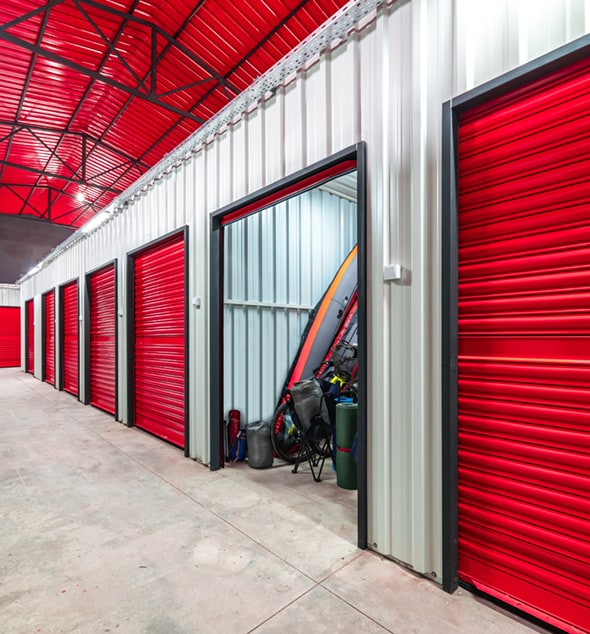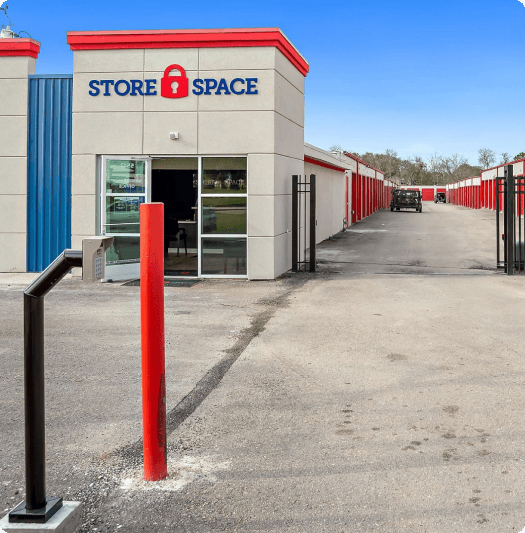Book Storage: 5 Ways to Keep Your Original ‘Hand-held Devices' in Excellent Condition

Before we get into book storage, we know there's nothing like a written book. A good book is a tangible manifestation of art, adventure, knowledge and escapism all in the palm of your hands.
Sure, e-readers have staked their claim to the market and have opened access to millions of titles for people who enjoy devouring books like cotton candy at a state fair.
But for those who like to savor books—the weight, the smell, the feel—the printed book is still king.
“One glance at a book and you hear the voice of another person, perhaps someone dead for 1,000 years. To read is to voyage through time.”
– Carl Sagan
What’s more, with a little preparation and forethought, books can be resold or handed down many times over, hopefully inspiring new generations of bibliophiles.
Whether you’re keeping your book collection in your home or a self-storage unit (our preferred choice!), there are a few factors to keep in mind to ensure your books are going to last.

How do I store my book collection?
Whether you’re using the plank-and-cinder-block method for shelves or have bookcases for days, book collections can easily overwhelm an apartment or even a dedicated room in your home (do homes even have “libraries” anymore?).
Not only that, but there are also some reasons that in-home book storage might not be the ideal solution. There are three main factors that can contribute to a book’s premature deterioration. Exposure to any or all of these can cause big problems:
1. Limit Sunlight
Who doesn’t like to sit in a sun-splashed corner on a comfy chair to read a book? But prolonged sunlight exposure like in a bookshelf can also damage a book’s cover art and cause the pages to turn brown.
2. Avoid Humidity
Southern novelists describing humidity is an art form in and of itself, painting the picture of impending doom or overwrought drama. But while it adds a palpable air to your William Faulker novel or Tennessee Williams play, humidity is not good for the books themselves. It causes condensation and dampness, which can lead to plenty of drama like warping, rot, insect growth and more.
“Men’s stiff collars wilted by nine in the morning. Ladies bathed before noon and after their three o’clock naps. And by nightfall were like soft teacakes with frosting from sweating and sweet talcum. The day was twenty-four hours long, but it seemed longer.”
— Harper Lee, “To Kill a Mockingbird”
3. Keep Out Pests
Speaking of insects, bugs and their eggs can destroy books (not to mention ruin a good time if a spider drops on your lap during “Wuthering Heights”). Yet another reason to have top-notch book storage available.
With those three potential issues, you can see how storing an entire book collection in your attic, basement or in front of a picture window might lend itself to issues. So, you have to ask yourself how you can keep your book collection safe and out of the way?
Read on for more tips to help you store your stockpile of books.
Do books need climate-controlled storage?
Why do most libraries have see-through bookshelves? They are easier to dust, sure, but they also allow for air flow between and around the books. In humid climates especially, this allows the books to breathe a little better, helping to stave off damage from humidity and condensation.
This concept is similar to that used in climate-controlled storage units (which make great places for book storage, by the way). These storage units are highly sought after by all types of collectors, including book aficionados, to help mitigate the damaging effects of humidity.
Climate-controlled storage units circulate cool or warm air throughout the storage unit to keep the temperature regulated between 55 degrees F and 80 degrees F year-round. This in turn reduces humidity by decreasing or increasing the relative humidity throughout the building.
Not all storage facilities have climate-controlled units. This can be because the prevailing climate doesn’t warrant temperature regulated units, or the facility might be older or place higher value on other amenities.
What is the best way to pack books for storage?
OK, sometimes you’ll have to use boxes for your book storage needs. It doesn’t have to be the end of the world if you treat them right. Don’t just throw them into boxes and hope for the best. Here are some book storage tips:
- Don’t over or under pack your boxes. Not enough space between books can cause books to bend, while too much space can lead to dents and dings.
- Use padding. Bubble wrap and acid-free paper between books will keep them from damage.
- Keep the boxes smaller. No one wants to lift your Harry Potter Hardcover Boxed Set and The Hobbit & The Lord Of The Rings Boxed Set at the same time!
- Watch how you stack them. Don’t rest them on their spine or stack books atop each other.
- Finally, don’t place your book boxes directly on the floor, either in your storage unit or at home. Use shelving if available, or rest boxes atop pallets or other boxes.
How do you store books for long term storage?
Collectors, of course, are taking book storage to the next level. You may not need archival-quality storage for your fourth edition paperback of Sidney Sheldon’s 1973 classic “The Other Side of Midnight,” but then again, who’s to judge?
Here are some extra steps true book collectors will take to protect their books:
- Save that dust jacket! Collectors know that a dust jacket in good condition can significantly increase the value of a book
- Use acid-free paper to wrap books or line boxes. Acid found in newspaper ink for instance can react to the ink and destroy the book.
- Large books can be stored lying flat, just don’t stack items atop them.
- Protect the spine and corners from dents and bends by taking extra care while handling.
- Add silica packets to boxes with books in them, or place moisture-absorbing products in the area to avoid damage from moisture. Silica packs and similar desiccants are important to have on hand, especially if climate control isn’t available.
- Finally, read our full guide for storing books long term.
For people with small apartments and living spaces, learn how to store books in small spaces.
Is it OK to store books in plastic boxes?
Yes, airtight/watertight bins can be used for book storage. It’s still important to pack them with the same care and consideration as you would any other storage medium, and make sure there’s no moisture in the bin before packing.
That said, avoid plastic wrap! Wrapping books in plastic can cause condensation, which can promote mold, mildew and even insect eggs and larvae.
Now, let’s get you booked!
Bad pun, but good idea.
Use our handy store location finder to locate the Store Space Self Storage nearest you, or call us at 833-786-7366.
Many Store Space locations offer climate-controlled storage, as well as drive-up storage units and indoor storage units that can be used for short- and long-term book storage. With month-to-month leases, you never have to worry about long-term contracts.
Whatever you decide, don’t forget about your books! Rotate your collection from time to time and revisit your favorites!
“Books should go where they will be most appreciated, and not sit unread, gathering dust on a forgotten shelf, don’t you agree?”
– Christopher Paolini







